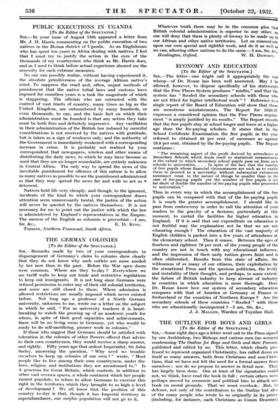THE GERMAN COLONIES
[To the Editor of the SPECTATOR.]
SIR,—Remarks made by two of your correspondents in disparagement of Germany's claim to colonies show clearly that they do not know why such outlets are more needed by her now than in the past. Before the War open doors were common. Where are they to-day ? Everywhere we see tariff walls to keep out trade and restrictive regulations to keep out immigrants. It is not long since Germans were refused permission to enter any of their old colonial territories, and some are -still closed to them. Where admission is allowed restrictions are usually imposed which never existed before. Not long ago a professor of a North German university, unknown to me, wrote me a letter on the subject in which he said, " For us university teachers it is heart- breaking to watch the growing up of an academic youth for whom, in spite of their good capacities and achievements, there will be no living room in Germany, yet who would be .ready to do self-sacrificing, pioneer work in colonies."
. If those who suggest that Germans should be satisfied with toleration in the colonies of other Powers offered that advice to their own countrymen, they would receive a sharp answer, and rightly. Fifty years ago that ardent Imperialist, Sir John Seeley, answering- the question, " Why need we trouble ourselves to keep up colonies of our own ? " wrote, " Most people like to live among their own countrymen, under the laws, religion, and institutions they are accustomed. to." Is it generous. for Great Britain, which controls, in addition to other vast oversea spaces, a whole continent which her people cannot populate, to refuse to allow Germans to exercise this right in the territories which they brought to so high a level .of development ? We all know that the position of this country to-day. is that, though . it has Imperial territory in superabundance, _our surplus population will not go to it.
Whatever truth there may be in the common plea that British colonial administration is superior to any other, no
one will deny that there is plenty of leeway to be made up in our African and other native territories. . Let us concentrate upon our own special and rightful work, and do it as well as we can, allowing other nations to do the same.—I am., Sir, &e.,














































 Previous page
Previous page